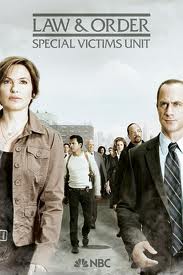 When I write the “Best of the Blogs” feature, I usually try to identify some common theme that ties together some of my favorite posts of the past week. It doesn’t seem to be working this week. I’ll leave it as a challenge to enterprising readers to see if they can connect the following dots in some way that is eluding me.
When I write the “Best of the Blogs” feature, I usually try to identify some common theme that ties together some of my favorite posts of the past week. It doesn’t seem to be working this week. I’ll leave it as a challenge to enterprising readers to see if they can connect the following dots in some way that is eluding me.
First, I stumbled across this fun blog called Prime-Time Crime Review. The author is a real-life sex-crimes prosecutor named Allison Leotta. She posts after each new episode of Law & Order: SVU with an evaluation of how realistic the episode was. I could pitch this blog as a crim-pro supplement for law students, but really it’s much more entertaining than that would imply. Sample comments on the October 14 episode:
What they got wrong: First, the dress the new ADA was wearing. Skin-tight red leather with ruffles? I don’t think so. But she did look amazing. But then she went over the top with her lawyering tactics. When the nutty professor came in to plea bargain with his high-paid lawyer, they argued and the prof asked, “Can I fire him?” The ADA answered, “Sure!” and got the prof a new (young, inexperienced) lawyer. That would never happen in real life. The criminal justice system is adversarial, which means the prosecutor cannot advise the defendant, hook him up with a defense attorney, or even talk to him alone once he has a lawyer. If a defendant asks a prosecutor for a new lawyer, she can set up a hearing where the judge can listen to his concerns and appoint a new lawyer for him. This was as realistic as Jennifer Aniston selecting the dress for Anglina Jolie to wear to the Oscars.
The blog reminds me of one of my favorite lines from my all-time favorite TV lawyer — while watching L.A. Law, Lionel Hutz sarcastically observed, “Oh, sure, like lawyers work in big skyscrapers and have secretaries. Look at him, he’s wearing a belt!”
In a more serious vein, Ian Ayres at Balkinization posts on “Our Love/Hate Relationship with Carrots and Sticks.” Here is the set-up:
“The honeymoon is over.” These were the words of Alberto Iturra, the leader of a team of psychologists who instituted a series of prizes and punishments to change the behavior of the 33 miners trapped in Chile. The miners have now been pulled up to safety. But during the crisis, the psychologists used incentives to get what they wanted. When the miners did what the psychologists wanted, they were given treats like TV and music. But if miners refused, say, to submit to daily interviews with psychologists, the psychologists would restrict the supply of cigarettes or wine.
Your reaction to this story probably says a lot about where you fall on an important policy and cultural divide. As a society, we have conflicting notions about both the fairness and efficacy of incentives.
If you are viscerally repelled by the story, you can point to several experiments to support the idea that carrots and sticks are often counterproductive.
Ayres then reviews research suggesting when incentives are and are not effective: “[C]arrots and sticks work well when there is a simple set of rules and a clear destination. But they fail when more complicated forms of problem solving are involved.”
For me, the obvious point of connection (not discussed by Ayres) is with law-student preparation for class. I have yet to speak with a law professor who is fully satisfied with the level of effort students put into preparing for class discussions. Would more carrots and/or sticks help? I assume that threats/promises of bad/good grades at the end of the semester are not effective tools to motivate careful day-to-day preparation. I can’t think of any examples of carrots. I suppose that one could offer cookies or some other treat to students who perform especially well in class, or for the whole class if everyone does well. But I have heard of a number of professors at other law schools who use short pop quizzes at the start of class to motivate better preparation. That sounds like a stick to me. And I’m told that the threat of a poor quiz grade is indeed a helpful way to make sure that students do their assigned reading. Then, too, there is also the Kingsfieldian threat of public humiliation if a student is not adequately prepared.
The Ayres post suggests that carrots and sticks might work if the goal is to get students to perform well-defined tasks, like reading and briefing assigned cases. On the other hand, I’m less concerned with students doing those basic tasks than with students thinking critically about what the cases mean and how they relate to one another. That sounds like the sort of higher-order task that is not susceptible to carrot/stick effects.
My final post of the week shares the delightful snarkiness of the first. David Lat at Above the Law asks, “Who Is Yale Law School’s Most Disgraceful Graduate?” Other than Bill Clinton, the list of nominees is rather conspicuously tilted towards Republicans. But Yale itself also gets a good skewering along the way, so there’s something here for everyone.

Around 2000, Law & Order had become one of the longest-running television shows based on a fictional premise.